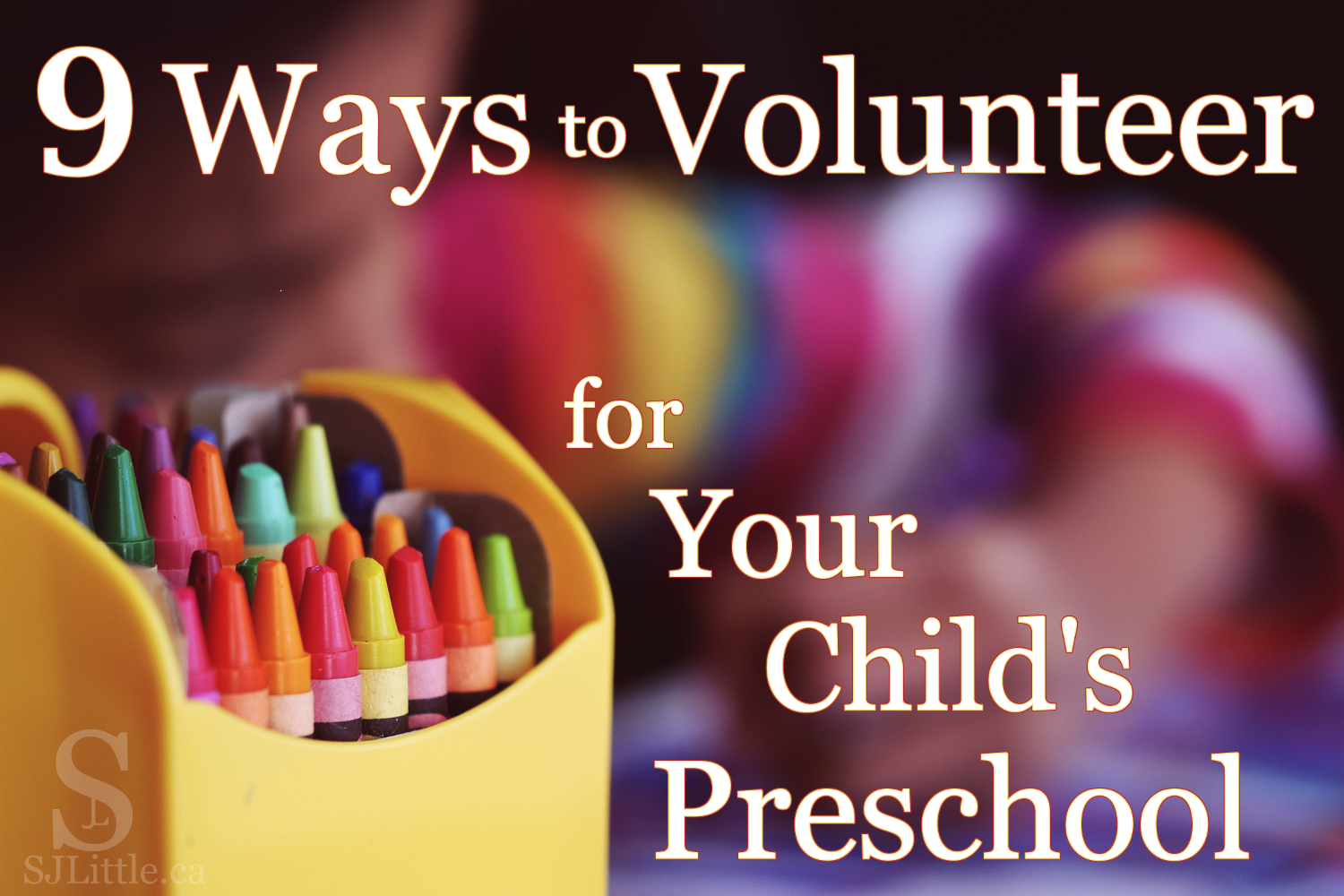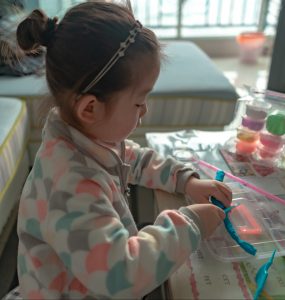
There are endless ways to help out your child’s preschool
Another school year is upon us. My, how time flies! As I prepare to welcome a new group of students, and you send your little one off to preschool, here are a few suggestions of helpful ways you could volunteer to support your child’s teacher.
Note that different teachers have different things that they prefer to do themselves, or different licencing rules, or needs in their class. If they say no when you offer to help, accept their answer.
1. Make playdough
- Preschoolers benefit in many ways from playing with playdough. Their hand muscles are strengthened in preparation for writing, their creativity is engaged, and teachers can use it as a chance to practice social and language skills. However, playdough costs money, and, with so many little hands touching it, playdough certainly does not last forever. Most preschool teachers I know would be grateful if you offered to make a batch.
- Tips:
- Your teacher may have a favourite recipe to share with you.
- Making the playdough can be done with your child (depending on the recipe), which can create fun family time and an opportunity to teach them to get excited about giving something away.
2. Craft prep/cutting
- Preschool teachers spend hours cutting paper in preparation for crafts and art projects among other things. However, I have to warn you on this one. Some preschool teachers can be extremely particular about the quality of cutting, others hardly care. Take a few weeks to watch what sort of arts and crafts your child is making, and the quality of cutting the teacher is doing. If you think you can match it, ask your child’s teacher if they would be interested in your help.
- Tips:
- If you take something home to work on, be sure to get it back to the teacher at or before the agreed time.
3. Donating your skill/expertise
- Sewing
- Is sewing something you enjoy and have decent ability in? Tell your child’s teacher. She may have a cloth doll or a dress-up costume in need of a few stitches. Alternatively, offer to make a few simple costumes for the dress-up corner such as a couple of tutus or capes.
- Computer skills
- Not all preschool teachers are skilled with computers. If your child is at a small preschool, an offer to help polish their website, etc. may be eagerly received.
- Community Helpers
- A common preschool theme is community helpers. This includes individuals such as firefighters, police officers, doctors, dentists, vets, and librarians. Even construction workers and bus drivers could be included. If this is you, and you enjoy talking with preschoolers, ask your child’s teacher if they would be interested in having you talk about your job for a couple of minutes in class. This would be especially beneficial if you have some sort of items to show the children or even to let the children touch.
4. Donating resources
- Wood
- Does your job involve working with wood? What may be scraps of wood destined for the garbage bin to you, may be treasures to your child’s teacher. I once had children make a keepsake craft out of donated flat baseboard. It was a hit!
- Boxes and paper

- Does your job involve very large cardboard boxes? Rather than throwing out or recycling a large box, ask if your child’s class could use it. Do you often have stacks of unused, clean paper to get rid of? Offer it to your child’s teacher. Even if the papers are too small for your purpose, many teachers would welcome papers as small as, say, 3″ by 3″.
5. Field trips
- Preschools often have a set number of adults needed for field trips and other unique activities. Finding that number of parents willing to come can be challenging. I have had to cancel activities in the past because not enough parents volunteered.
Tips:
-
- Keep an eye open for announcements about field trips or other activities and ask your teacher if they’re looking for volunteers.
- When volunteering, remember that you are there to watch the children, not primarily to stand to the side talking with other adults.
- Come prepared. Dress appropriately for the activity.
- Be aware that some children react unexpectedly when their parent is volunteering. More on that later.
6. Special events
- Does your child’s preschool have a Valentine’s party, a picnic day, a Halloween parade, a Christmas party, or a multicultural day? Ask the teacher if they would like a volunteer to help. Depending on the activities planned and the particular group of children, they may say yes or no.
7. Washing toys
- Did you know that preschool teachers wash their toys a lot? Some preschools wash toys weekly, others wash them monthly. Whatever the case, if you offer, they may be very happy to accept an offer to help wash some toys, or, based on a variety of reasons, they may have to say no. Note that toy washing is not a glamorous job and is often monotonous.
8. Donations
- Depending on your particular preschool program, your child’s teachers may gladly welcome a variety of donations. Many of these items could be donated when your child outgrows them. Be sure the items are in good shape prior to donating and age appropriate. These items could include:
- Clothes (Keeping extra clothes on hand for when a child has an accident but didn’t bring a change of clothes is important.)
- Plastic grocery bags (Clean and without holes. These are valuable when a child has an accident, or for a variety of other purposes.)
- Clean diapers (If your preschool has a non-toilet trained class extra diapers are great!)
- Toys
- Halloween costumes (When a child forgets to bring a costume, having a spare costume for them to use is wonderful.)
- Dress-up clothes, including multicultural outfits
- Snow pants, gloves, swimsuits (If your school does activities requiring these items, having a spare can be a lifesaver.)
9. Volunteering in the classroom
- Now I suspect the first thing you think of when someone suggests volunteering for your child’s preschool, is staying in the classroom as an extra set of hands. There is a reason I didn’t put this first on the list. Every school has their own policy on this: some encourage it, some discourage it. Wonder why? There are several reasons.

It is always intriguing to me to watch the way a child’s behaviour changes when their parent stays in the classroom for a day. Some children barely change their behaviour, while others can go from perfectly behaved and good at listening, to rolling on the floor in a temper tantrum. Others can go from mischievous to well behaved. I suspect it depends a lot on how the child responds to the parent at home. This is why some preschools discourage parents from staying in the classroom, at least for the first couple of months of the school year. It is not because they don’t want the help, or because they are trying to hide anything, but because sometimes having a parent volunteer is more trouble than help.
- Tips:
- If your child cried the first couple days of school (many do), then volunteering to stay in the classroom right away may not be beneficial. If your child has just begun to settle in, your presence may throw that off and slow the adjusting process. Instead, wait until later in the school year to volunteer.
- The first couple of days of class can be hectic. Some preschools bring in extra staff or volunteers to help. If you have childcare-type experience and your child is not disrupted by your presence, the teacher may welcome your help.
- Respect your preschool’s policies surrounding parent volunteers. They are there for a reason.
Conclusion
I hope this list has given you food for thought when it comes to volunteering for your child’s preschool. There are endless ways you can help. When you save the school money, by donating items, or save the teacher time, by volunteering for tasks, you enable that time and money to be spent in other ways to provide an even richer preschool experience for your child. However, as mentioned, keep in mind that each preschool is different and may have different needs and policies. What may be a tremendous help to one teacher, may not be welcomed by the next.
On behalf of all the teachers and preschoolers who will benefit from your volunteered time, skills, and/or resources. Thank you!
